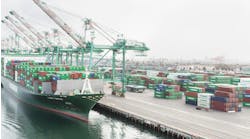Tariffs on Chinese Semiconductors Could Slow Chip Industry Growth
Newly-imposed tariffs on semiconductors—and parts and equipment used for chip production—imported into the U.S. from China could lead to an all-out trade war, resulting in higher prices and lower semiconductor sales growth, according to semiconductor industry analysts and trade association officials.
The office of U.S. Trade Representative (USTR), recently announced that 25% tariffs would be placed on $34 billion in Chinese goods, including many semiconductors and products in the semiconductor supply chain. USTR imposed the tariffs, which will begin July 6, following an investigation into the trade practices of China. The investigation found that China’s “acts, policies, and practices” related to technology transfer, intellectual property, and innovation are unreasonable and discriminatory, and burden U.S. commerce.
“We must take strong defensive actions to protect America’s leadership in technology and innovation against the unprecedented threat posed by China’s theft of our intellectual property, the forced transfer of American technology, and its cyber-attacks on our computer networks,” said USTR Robert Lighthizer. He added that China is trying to undermine America’s high-tech industries and U.S, economic leadership through unfair trade practices and industrial policies.
However, industry associations are opposed to the tariffs. For instance, the Semiconductor Industry Association said while the chip industry shares the Trump Administration’s concerns about China’s forced technology transfer and intellectual property (IP) practices, “the proposed imposition of tariffs on semiconductors from China, is counterproductive and fails to address the serious IP and industrial policy issues in China.”
Another trade group, SEMI, whose membership includes semiconductor companies and chip equipment manufacturers and other services providers in the electronics supply chain, agrees the new tariffs will do nothing to address China’s trade practices. “Instead the tariffs will harm companies in the semiconductor supply chain by increasing business costs, introducing uncertainty, and stifling innovation,” according to Jay Chittooran, SEMI’s public policy manager.
Testifying at a government hearing before the tariffs were imposed, Chittooran said the tariffs will potentially cost tens of millions annually in additional taxes and lost revenue because of reduced exports. He added the tariffs “threaten thousands of high-paying U.S. jobs, and will not solve U.S. concerns with China.” The tariffs will also undercut the ability of U.S. chipmakers to sell overseas, stifling innovation and curbing U.S. technological leadership, according to Chittooran.
Retaliation Expected
Industry analysts say the tariffs will be detrimental to the industry because China will retaliate with tariffs on U.S. goods. “I don’t see much good coming as a result of the tariffs,” said Brian Matas, vice president of market research for IC Insights, based in Scottsdale, Ariz. “I think the tariffs will end up causing more grief than they will help U.S, companies. They will create more headaches, hassle, and retaliatory measures against the U.S.,” said Matas.
Tariffs on China and on other countries could end up adversely impacting economic growth because the cost of the tariffs may be passed on to consumers when they purchase cell phones, computers, and other electronics goods. “Consumers will probably end up hurting the most from this because as tariffs are raised, prices will increase and consumer spending will probably decline,” said Matas. If consumer spending is reduced it will negatively impact GDP, he said.
The tariffs could also be costly to U.S.-based semiconductor companies that fabricate semiconductors in the U.S. but ship them to China for packaging and testing. If the chips are then shipped back to the U.S., semiconductor companies could end up paying tariffs on their own products.
Some analysts say there are better ways to improve U.S, competitiveness than imposing tariffs. “If you look at China and Korea and some other countries, they are supporting local manufacturing with tax credits and other help in terms of education and credits,” said Jim Feldhan, president of Semico Research in Phoenix. “That might be a better way of fostering more competitive manufacturing here rather than trying to go the protectionist route.”
More IP at Risk
Feldhan added there the tariffs may make China less willing to be cooperative in protecting intellectual property of U.S. companies and could result in more IP “being stolen as a result of this trade war.”
There probably are some corrections that need to be made with trade policies with China, but it should be done diplomatically and not with tariffs, said Matas. “Maybe you team up with some allies” and negotiate with China to make changes to trade policies, he said. “Forming a coalition may be a smarter way of going about it.”
Matas noted that the electronics supply chain is global. “The U.S. relies too much on companies in the Asia-Pacific region to do some manufacturing or subassemblies or packaging to start slapping tariffs on everyone,” said Matas. “The world is just too interconnected to do something like that.”









